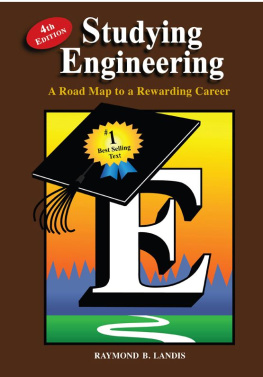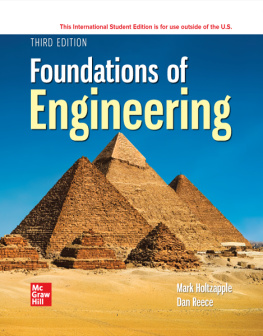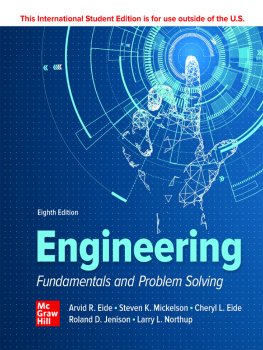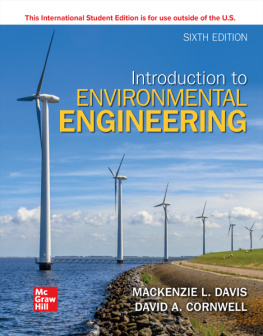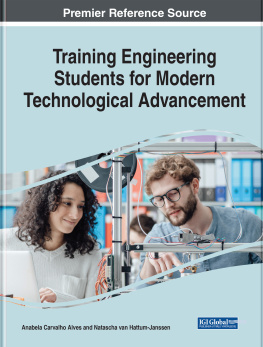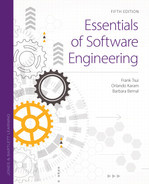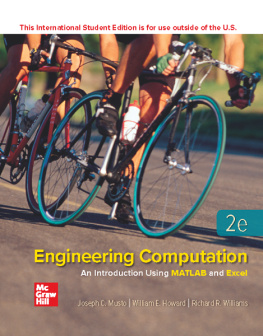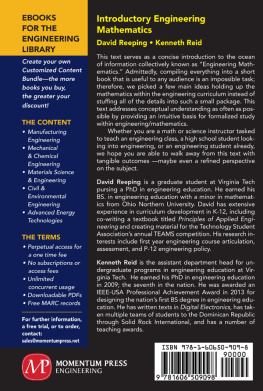Raymond B. Landis - Studying Engineering: A Road Map to a Rewarding Career
Here you can read online Raymond B. Landis - Studying Engineering: A Road Map to a Rewarding Career full text of the book (entire story) in english for free. Download pdf and epub, get meaning, cover and reviews about this ebook. year: 2013, publisher: Discovery Press, genre: Religion. Description of the work, (preface) as well as reviews are available. Best literature library LitArk.com created for fans of good reading and offers a wide selection of genres:
Romance novel
Science fiction
Adventure
Detective
Science
History
Home and family
Prose
Art
Politics
Computer
Non-fiction
Religion
Business
Children
Humor
Choose a favorite category and find really read worthwhile books. Enjoy immersion in the world of imagination, feel the emotions of the characters or learn something new for yourself, make an fascinating discovery.
- Book:Studying Engineering: A Road Map to a Rewarding Career
- Author:
- Publisher:Discovery Press
- Genre:
- Year:2013
- Rating:4 / 5
- Favourites:Add to favourites
- Your mark:
Studying Engineering: A Road Map to a Rewarding Career: summary, description and annotation
We offer to read an annotation, description, summary or preface (depends on what the author of the book "Studying Engineering: A Road Map to a Rewarding Career" wrote himself). If you haven't found the necessary information about the book — write in the comments, we will try to find it.
Since Studying Engineering: A Road Map to a Rewarding Career exploded onto the market in 1995, it has become the best selling Introduction to Engineering textbook of all time. Adopted by over 300 U.S. institutions, and reaching more than 150,000 students, the book has made major inroads into the sink or swim paradigm of engineering education. Armed with the book as a powerful tool for student development, large numbers of engineering programs have implemented Introduction to Engineering courses to improve the academic performance and retention rates of their students.
Now, this pioneering text has been updated and expanded to bring students even more clarity in the process of achieving success in engineering study.
Significant new material has been added to the Fourth Edition including:
A Prologue to provide students with a perspective on what this book has to offer and how to get it.
New sections on topics including fixed vs. growth mindset, reverse engineering, sustainability, life-long learning, study abroad, entrepreneurship, teamwork and leadership, engineering ethics, and inspirational and motivational quotations
Incorporation of the University of Maryland human-powered helicopter project to illustrate the engineering design process in action
The adoption of the National Academy of Engineering s Grand Challenges for Engineering to provide an indication of future directions for engineering
Substantially more graphics to make the text more accessible and readable
Studying Engineering is written for students both those who are already engineering majors and those who are considering engineering as their field of study.
The purpose of this innovative and exciting book is to enhance student success. Through its eight chapters it teaches students about:
1.The keys to success in engineering study
2.The rewards and opportunities of an engineering career.
3.An understanding of the field of engineering past, present, and future
4.Insight into the learning process
5.Academic success strategies needed to excel in mathematics, science, and engineering courses
6.The process of personal development needed to ensure that their behaviors and attitudes support their goal of becoming an engineer
7.Ways to enhance the quality of their education through participation in student organizations, pre-professional employment, engineering projects, study abroad, and service the institution and/or community
8.The engineering education system and how to take full advantage of that system.
Students can read the book on their own or use it in conjunction with an Introduction to Engineering course having a student development/student success focus. Reflections are interspersed throughout each chapter so that students can read a section and then stop to engage in a guided reflection about what they just read. Completion of many of 203 end-of-the-chapter problems provides opportunity for significant learning experience. A design project to Design Your Process of Becoming a World-Class First-Year Engineering Student provides a vehicle for students to become actively involved in their growth and development as an math/science/engineering student.
Raymond B. Landis: author's other books
Who wrote Studying Engineering: A Road Map to a Rewarding Career? Find out the surname, the name of the author of the book and a list of all author's works by series.

